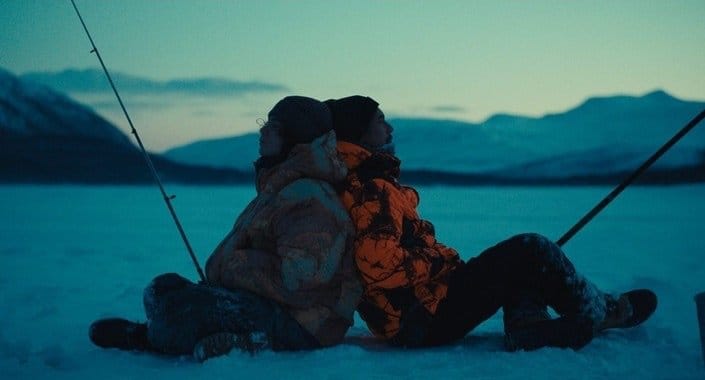Nature’s an easy place to idealise. Both the tortured artist’s getaway of preference and where wayward souls (at least in movies) go for renewed purpose, nature keeps us honest—or so we like to believe. Seclusion, after all, isn’t kind to the self-avoidant. But for a divorced parent played by Film Twitter’s favorite lawyer, the Norwegian fjords’ rugged terrain is a means of escaping, rather than facing, reality. Desperate to recover lost time, Tom (Swann Arlaud, Anatomy of a Fall) persuades his teenage son, Roy (Woody Norman, C’mon C’mon), to join him off grid for a year.
Lest anyone forget that Sukkwan Island begins by introducing us to Roy when he’s a weathered adult, a plaintive synth score and dabs of expressionistic foreshadowing (like Tom diving into a lakebed of mirrored clouds) are on hand to remind us this adventure probably isn’t going to end well.
As the temperature drops, so does the romanticism of isolation that runs high upon their arrival during the hospitable months of summer. Their only ticket off the island is the seaplane pilot (Alma Poystï, Fallen Leaves) through whom they periodically receive supplies. Are they attacked by a bear? Does a blizzard strand them without resources? The answer is both simpler and more complicated, as neither the elements nor scarce resources turn out to pose as great a threat to the pair’s safety as Tom does himself.
Rescue is only a radio dial’s turn away, but Tom, first through emotional manipulation and later outright sabotage, is hellbent on keeping outsiders away from the hidden world they’ve built together.
Sukkwan Island isn’t exactly the survival thriller promised by its logline. Even before this relatively straightforward family drama morphs into a metafiction crossing Atonement with Aftersun, unexpected tension is generated by Roy needing to increasingly manage Tom’s depression. Playing a father so incapable of confronting his own failings that he selfishly traps his child in a prison of his own making, Swann Arlaud blends the charisma he displayed in Anatomy of a Fall with a deep-seated and almost parasitic vulnerability. Like Ben Foster’s PTSD-saddled vet in Debra Granik’s Leave No Trace, Tom is as much a warmly protective figure as he is a credible danger to his child’s well-being—a danger from which Roy, judging by the sunken, tattooed face he wears in the present, never fully recovers.
Sukkwan Island doesn’t quite stick the landing but achieves its own kind of catharsis. By hastily invoking them to shock the audience, the third act fumbles what might’ve been more resonant ideas about self-negotiating trauma through storytelling were the film sooner forthcoming about its conceit. However, the movie’s broader focus on inherited pain isn’t disserviced by the redirection.
Director: Vladimir de Fontenay
Cast: Swann Arlaud, Woody Norman, Alma Pöysti
Writer: Vladimir de Fontenay, (based on the novel by David Vann)
Producers: Eliott Khayat, Carole Scotta
Music: Florent Chronie-De Maria, Jeremy Villecourt
Cinematography: Amine Berrada

